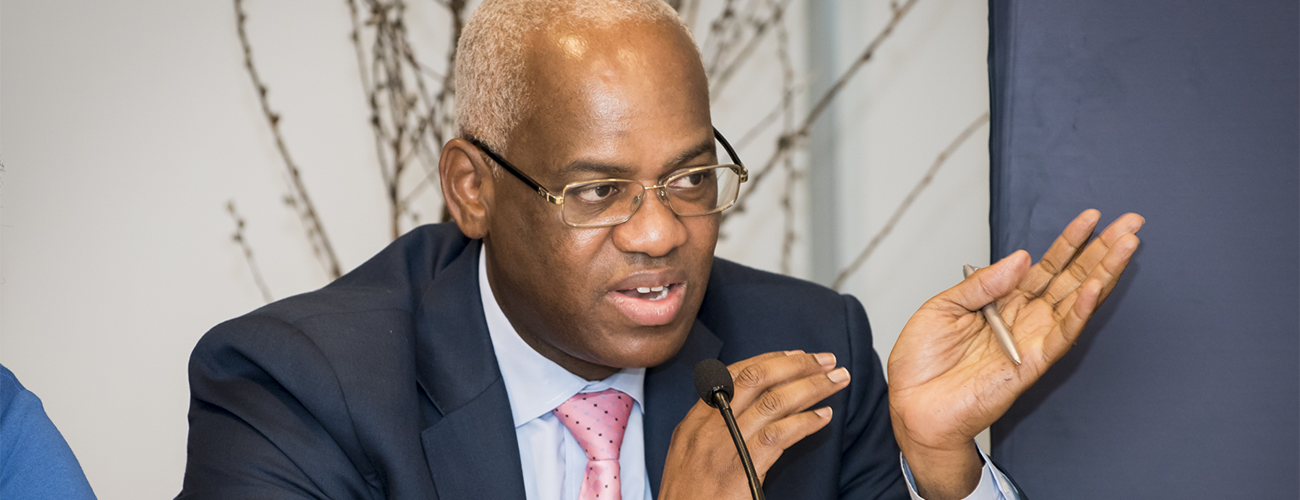With international challenges including terrorism, the refugee crisis, and the volatile security situation in fragile states directly affecting them, Africans are especially keen to take charge of their continent’s destiny.
UN cooperation with regional organizations like the African Union (AU) is at an all time high, El Ghassim Wane, United Nations Assistant Secretary-General for Peacekeeping Operations, said. “The Africans want to take control of peace on their own continent,” he said.
UN and AU peace operations are mutually interdependent on several levels, and by dividing labor with regional actors, the UN can carry out its responsibilities with more efficiency and effectiveness than would be the case if the UN had to act on its own. With the relationship between the organizations already growing, “We don’t need to reinvent the wheel,” he said, only to deepen and institutionalize their joint work.
Mr. Wane’s remarks were part of a May 25, 2016 IPI event, “Consolidating the AU-UN Strategic Partnership for an Effective International Peace and Security Architecture,” which brought together an expert panel to identify which elements of this relationship need to be further strengthened, and generate specific recommendations on key issues.
Cedric de Coning, Senior Research Fellow at the Norwegian Institute of International Affairs (NUPI) and Senior Advisor at the African Centre for the Constructive Resolution of Disputes (ACCORD), agreed with Mr. Wane, adding that we “need to see AU peace operations in the context of the continent acting in its own area, in contrast to others acting extraterritorially.”
Dr. de Coning also discussed his recently published book, The Future of African Peace Operations: From Janjaweed to Boko Haram, which makes recommendations on key issues in AU-UN peace operations, such as shared analysis and planning, support and financing, and transitions.
Tekeda Alemu, Permanent Representative of Ethiopia to the United Nations, said that the three African members of the UN Security Council have a key role in ensuring coordination with the Peace and Security Council (PSC), the standing organ of the AU for the prevention, management and resolution of conflicts. “This is not only critical for the African perspective, but also in promoting coordination between partners,” he said.
Donald Kaberuka, High Representative for the AU Peace Fund, drew on his background in finance to emphasize that it is evident to anyone working in fragile states that security issues “are not only issues for ambassadors, but issues for investors, and African citizens.”
He described the UN as “ill-equipped” to handle emerging regional terrorist groups like Boko Haram and Al Shabaab. “The AU has been doing an excellent job under difficult conditions, and underfunded,” he said. Even when there was political support for what the AU was trying to do, he said, the support was “unpredictable, voluntary, ad-hoc.”
This kind of unpredictable support proved problematic because “If there is no overall strategy, there is no exit strategy. Whoever is providing support can exit at the point of their choice.”
Now more than twenty years old, the AU Peace Fund must be re-engineered for today’s and tomorrow’s challenges, he said. “We try to find resources for the fund from within the continent, and partners in Africa and outside, with the aim of having a roadmap which shows how by 2020 the African contribution will be at 25%” he said.
Monica Juma, Principal Secretary at the Ministry of Foreign Affairs and International Trade of the Republic of Kenya, said that because regional actors are already on the ground, they are quicker to respond in a time of crisis than international forces. “Increasingly, regional organizations are finding themselves as first responders,” she said. With the African Union feeling the impact of crises around them, she asked, “How can we support those types of deployment?”
She highlighted the politics of sharing responsibility for the maintenance of international peace and security. Some members of the Security Council feel regional organizations are “eating into our forte” and are reluctant to delegate authority. “When do you create a division of labor, and what does it look like?” she asked them. “The Fundamental question is, ‘How do we create the necessary skill set in this range of scenarios?’” she continued.
When responsibilities are not clearly divided at the outset of a crisis through donor coordination, there are consequences, such as “different partners jumping in, further fragmenting the situation.”
Arthur Boutellis, Director of IPI’s Center for Peace Operations, moderated the discussion.
The event was co-hosted by the Norwegian Institute of International Affairs (NUPI) and the Nordic Africa Institute.








